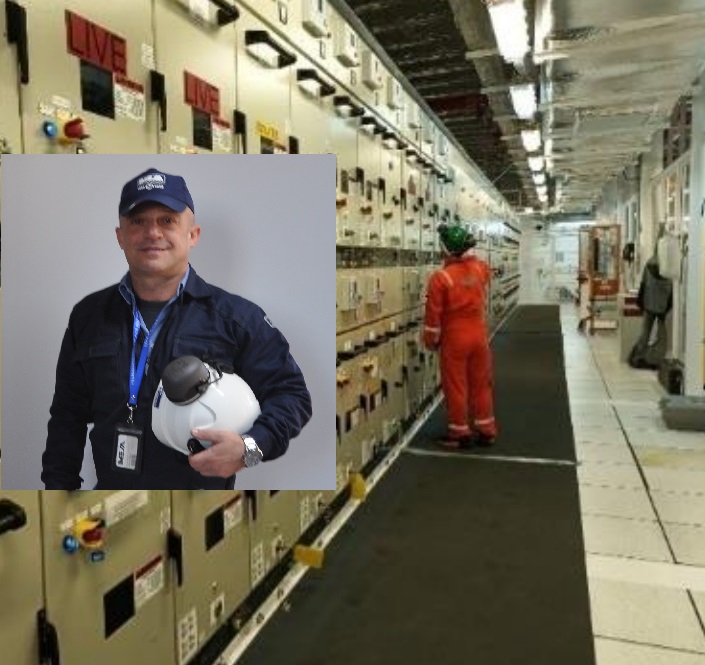Michela: Hi Michele, today we’re meeting another veteran of Imesa, you deal with Service. Would you like to tell us how you joined the company?
Michele: To tell the truth, I joined a bit by chance, Back in 1999, I turned to a temp agency, which placed me in the production department, specifically in the Mechanical Assembly department. From the very beginning, however, I had the opportunity to get involved in service, an aspect that soon led me to work not only in Italy but also abroad. The first international missions were essential for my growth, not only professionally.
Michela: The technical assistance service, or “Service”, is a cornerstone of Imesa’s success and reputation. In a technical field such as electrical panels, the reliability and operational continuity of the solutions provided are essential for customers. What have been the main challenges or changes you have faced?
Michele: Michela, that’s a big question!
I believe this job goes beyond simple technical assistance. It’s about solving complex problems, handling unforeseen situations, and doing it in environments that can be very different from the ones we’re used to working in. This means you need to have the right attitude and a great deal of adaptability.
Every country has its own work culture and different approaches to problem-solving, so the difficulty is not only technical but also about how to communicate and interact with people. It’s important to be empathetic, respectful, and to make the team feel at ease, even when discussing more technically complex topics.
Then there’s stress management and time management, which are crucial. Often, we’re called to work under pressure, so it’s essential to know how to prioritize and work methodically.
Michela: Michele, can you tell us what are the most rewarding aspects of your job, since I imagine you also make many sacrifices by being away from home for long periods.
Michele: Yes, it’s true, work in general involves sacrifices if they are carried out with responsibility and commitment. In this type of job, there’s also the sacrifice of being away from home during holidays like Christmas, Easter, birthdays, anniversaries, etc.. It’s never easy, but I always try, as much as I can, to make my presence felt in other ways by maintaining a good work-life balance, using the time I spend at home to be with my loved ones. Their understanding and support are essential for me.
As for the most rewarding aspects of my job, it’s certainly the opportunity to face stimulating challenges and see the concrete results of the projects I work on. Reaching the goal is certainly important, but how we achieve it is just as important: the quality of the work, attention to detail, meeting deadlines, and fulfilling the client’s needs.
It’s how we achieve the result that makes the difference in terms of satisfaction, trust, and reputation, and often it’s what helps us maintain long-term relationships with our clients.
All of this is what gratifies me the most!
Michela: What intervention have you carried out that has left the biggest impression on you?
Michele: Let’s say that all the interventions I’ve participated in have left an impression on me for different reasons, but here are a few: I particularly remember my first experience in China, where I was sent for the testing of some equipment. It was an important mission, especially because it allowed me to deal with work dynamics outside of Europe for the first time. It was a real test that gave me a lot of confidence.
Another impressive intervention was when I worked as a Site Manager during the construction of electrical substations, my first construction site. This project took place on Karimun Island in Indonesia, where I had to manage a completely new context and a team of 54 people. I alternated with a colleague who had extensive experience in this type of activity, and I remember him with great respect. The main difficulty was when he wasn’t there because his support and experience were vital for dealing with the problems that arose continuously. So I can say that this experience taught me a lot about leadership and resource management.
Working in these environments was extremely challenging, both due to logistical difficulties and safety conditions that were not always ideal, so developing a great deal of resilience became essential.
Michela: How would you describe Imesa’s corporate culture today compared to when you first started?
Michele: Today, there’s more attention to employee growth, both in terms of training and career opportunities. When I started, we were very focused on practical work; today, there are training programs and more involvement in company decisions. There is more focus on safety, and we also have more flexibility in working hours, which I really appreciate, even though I’m often away from home.
Michela: What does Imesa mean to you, after all these years?
Michele: After 25 years in the company, I can say that it represents more than just a workplace for me. It’s become a real family. I’ve shared many experiences, both professional and personal, with my colleagues. I feel part of something important, and the stability and sense of belonging I have here are fundamental values for me. I hope to continue contributing for many more years.
Michela: Thank you Michele, good work!
